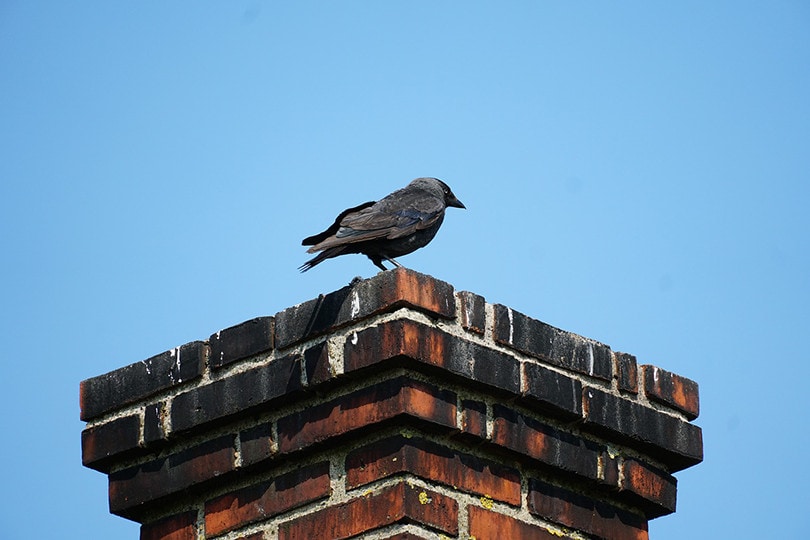How to Get Birds Out of a Chimney? 3 Proven Methods
Last Updated on

In the history of human expansion, we have been slowly and surely taking over the natural habitat of many bird species. Opportunistic birds have had to adapt to a life surrounded by manufactured structures, which leads to some sticky—or sooty—situations!
Nesting birds often find the confines of a chimney a lovely place to settle in, but we humans do not. Nesting birds in chimneys bring noise disruption, health risks, and fire hazards.
Getting birds out of a chimney is no easy feat, but here’s our fail-proof guide. We’ve also included our top tips for preventing birds from entering your chimney in the first instance.
Before You Start
Ensure that you never use your fireplace while there are birds or nests inside the chimney. Lighting a fire under them might seem like a good way to get them out, but smoke can cause fatalities of the birds, which is illegal for protected species.
Additionally, if your chimney has feathers and nesting material inside it, it can be a potentially dangerous fire hazard.
Sometimes you may light the fire, not knowing there is a bird’s nest inside. We strongly recommend yearly inspections and cleaning your fireplace and chimney at the beginning of winter.
Removing Birds From a Chimney
1. Use a Chimney Sweep
The problem with clearing chimneys is they are long, dark, and inaccessible to us without tools! Fortunately, there are tools specifically made for chimneys. Purchasing a chimney sweep can not only help you to remove birds but also to clean the chimney yourself regularly.
Chimney sweeps are used by entering the sweep from the top of the chimney downwards. The sweep can push birds and nests down into the fireplace itself. Ensure you keep the fire door closed to contain the birds. The only thing worse than birds in the chimney are birds in the house!
Once they are in the fireplace, close the flue to trap them in there. Then, if you are confident, use a towel or gloves to remove the birds into a box and relocate them out of the home.
Only utilize a chimney sweep if the nest is empty. This tactic can easily kill young birds or break eggs.

2. Bird Scarer
Birds like chimneys because they are a safe, secure place to reside. In particular, predators like birds of prey cannot reach them. You can scare them away to get them to move on from our chimney before they settle into the nest.
Sound-emitting bird scarers can play various sounds that frighten small birds, such as vocalizations of predators.
Of course, this sound will get tiresome to play repetitively, so it’s best used each time the bird returns to the chimney, especially at dusk as they settle down for the evening.
Banging pots and pans can have the same effect within the fireplaces to spook them from the chimney. Repeating this sound scaring will soon teach nearby birds that the chimney is not a safe place to be.
3. Hire a Professional
For particularly stubborn birds, no matter how you try to maneuver the chimney sweep or scare them out, they stay put. In this case, it’s best to consult a professional pest remover or chimney cleaning organization.
Many species of bird are protected by law, including moving their nests. Animal control, pest control, and some chimney cleaners will have the necessary training to legally and ethically remove and relocate birds from your home.

Why Do Birds Nest in Chimneys?
The dark, sooty space of a chimney certainly doesn’t seem like a nice place to live. But compared to the weather-exposed forest crawling with predators, a chimney is an amazing place for small birds to be safe.
The chimney also funnels hot air from your home, so it is a warm spot for birds during the winter. The height of the chimney tip is a vantage point for the area surrounding your home. Basically, chimneys are prime properties for birds.
Keeping Birds Out of Your Chimney

To prevent the battle of removing birds from your chimney, it’s best to prevent them from getting inside altogether. After removing birds from the chimney, you should immediately investigate making the chimney bird-free.
Here are a few of our best tips:
- Install a chimney cap. Chimney caps allow smoke to move out of the fireplace with ease, preventing any critters from climbing down into it. They also keep the rain out of the flue.
- Physical deterrents. Physical barriers such as spikes and wires can cause discomfort for approaching birds. They’ll learn to avoid this area so as not to get hurt.
- Scare them off. Placing a dummy predator such as an owl or a bird, or using motion activated noise generator can do the trick.
- Chemical repellents. Anti-bird products are used around the home and garden to keep birds at bay. Utilizing these products may also be useful in keeping birds away from the chimney space.
- Regular chimney cleaning. The sneakier birds may occupy and nest in your chimney without you even knowing. It can be dangerous to light your fire when unaware it is blocked with nesting material. Regular chimney cleaning is a must, especially before the first fire of the winter months.
Related Read: How To Get Rid Of Birds In Attic (8 Proven Methods)

Conclusion
Even the most avid bird lovers don’t particularly like to share their home space with wild birds. Keep birds out of your chimney by physically blocking them out and utilizing scare tactics.
If you still want your local birds to have warm, safe places to nest, consider putting up nest boxes in the wooded areas near your home.
Featured Image Credit: karsten_madsen, Pixabay
About the Author Sophie Herlihy
After an early start in the veterinary industry and as a conservation educator at Disney’s Animal Kingdom in Florida, Sophie has since been a successful Zookeeper and Conservationist, specializing in native New Zealand species. When she isn't bird watching in native forests, she can be found with her husband on their sheep and beef station, far from civilization. Sophie enjoys her writing career as it provides opportunities to help and support pet owners of all kinds and getting to research and write about a broad range of topics. The only downside is the long list of strange searches in her internet history!
Related Articles:
10 Types of Hummingbirds in Arkansas (With Pictures)
8 Types of Hummingbirds in Nebraska (With Pictures)
5 Types of Hummingbirds in Idaho (With Pictures)
3 Types of Hummingbirds in Mississippi (With Pictures)
8 Types of Hummingbirds in Kansas (With Pictures)
5 Types of Hummingbirds in West Virginia (With Pictures)
5 Types of Hummingbirds in Ohio (With Pictures)
Where Do Nuthatches Nest? Nuthatch Nesting Habits Explained
